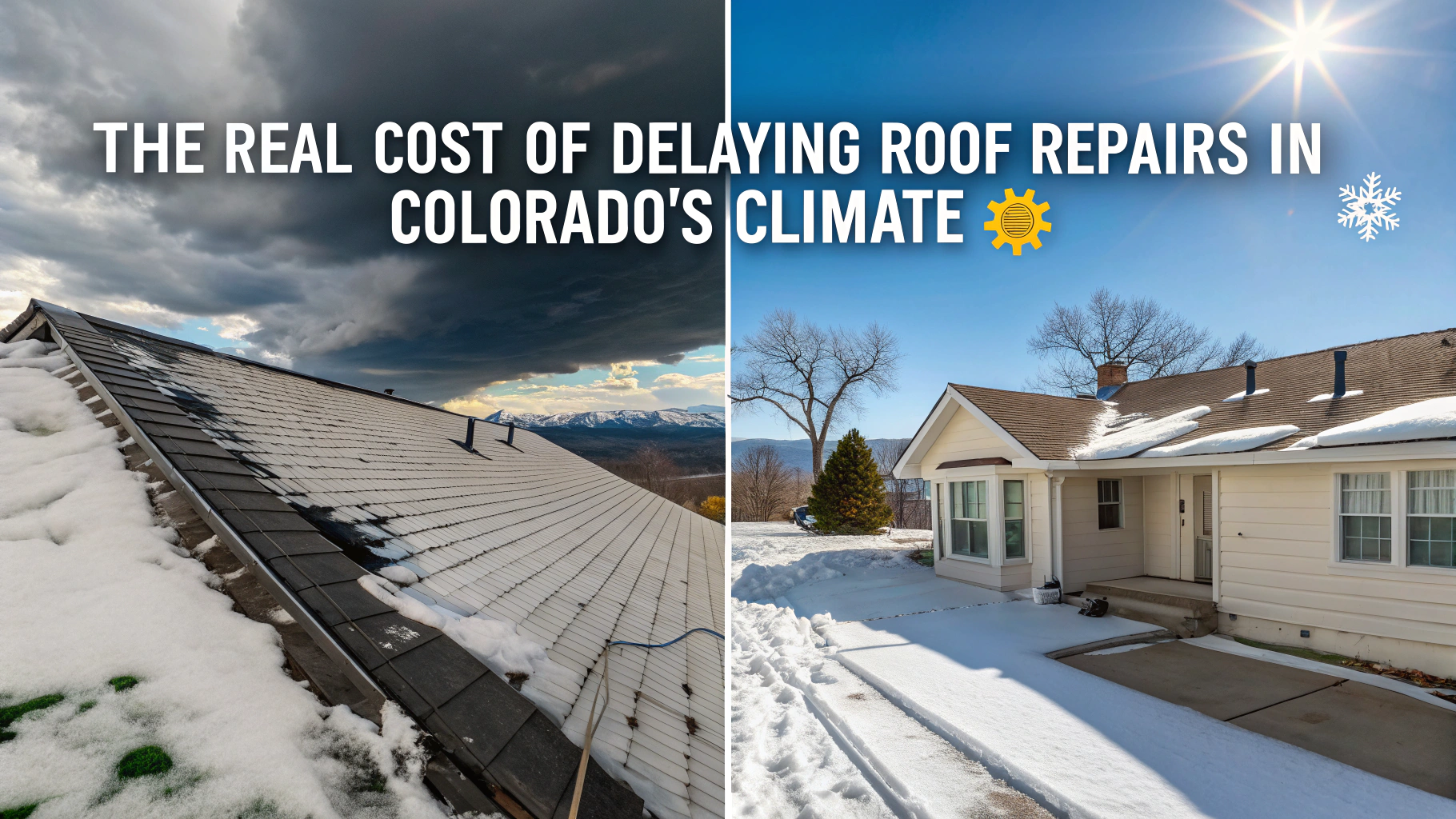Colorado’s extreme weather patterns can turn minor roof issues into major structural problems when left unaddressed.
Mountain snowfall, intense UV exposure, and dramatic temperature swings create unique challenges for maintaining residential and commercial roofs in the state.
Understanding the true costs and risks of postponing roof repairs helps property owners make informed decisions about roof maintenance.
Financial Impact of Delayed Repairs
A small leak that might cost $500 to fix today could lead to thousands in structural repairs if water damage spreads to interior walls and ceilings.
Insurance companies may deny claims for damage that results from neglected maintenance issues.
- Average cost of minor repair: $300-800
- Major structural repair: $2,000-10,000+
- Full roof replacement: $8,000-20,000+
Common Colorado Roofing Issues
- Ice dam formation
- Wind damage to shingles
- UV deterioration
- Hail impact damage
- Snow load stress
Warning Signs That Need Immediate Attention
- Water stains on ceilings
- Missing or curled shingles
- Granules in gutters
- Daylight visible through roof boards
- Sagging roof deck
Preventive Maintenance Tips
Schedule professional inspections twice yearly – typically in spring and fall.
Clear snow buildup carefully using a roof rake to prevent ice dam formation.
Keep gutters clean and properly aligned to ensure proper drainage.
Finding Qualified Colorado Roofing Contractors
- Check licensing through Colorado Department of Regulatory Agencies (DORA)
- Verify insurance coverage and bonding
- Read reviews on BBB and local platforms
- Get multiple written estimates
Contact DORA at (303) 894-7855 or visit dora.colorado.gov to verify contractor licenses.
Making Smart Roofing Decisions
Document all roof damage with photos and detailed notes for insurance purposes.
Consider upgrading to impact-resistant materials that qualify for insurance discounts.
Work with contractors who understand local building codes and high-altitude installation requirements.
Emergency roof repairs in Colorado: Call (800) 227-6066 for the Colorado Roofing Association’s contractor referral service.
Weather-Related Considerations
High altitude locations require specialized roofing materials rated for extreme UV exposure and temperature fluctuations.
Different regions of Colorado face varying challenges:
- Front Range: Hail and wind damage
- Mountains: Heavy snow loads and ice dams
- Western Slope: Intense sun exposure and thermal cycling
Insurance and Warranty Factors
Many insurance policies require proof of regular maintenance to maintain coverage.
- Document all inspections and repairs
- Keep receipts for materials and labor
- Take dated photos of maintenance work
- Report damage promptly to insurance
Warranty Considerations
Manufacturer warranties may be voided by:
- Improper installation
- Lack of maintenance records
- Non-certified repairs
- Unauthorized modifications
Protecting Your Roofing Investment
Regular maintenance extends roof life expectancy by 20-30% on average.
Consider these long-term protection strategies:
- Install proper ventilation systems
- Upgrade insulation to prevent ice dams
- Choose materials rated for Colorado’s climate
- Maintain detailed service records
Safeguarding Your Colorado Property
Taking proactive steps to maintain your roof is crucial in Colorado’s challenging climate. Regular inspections, prompt repairs, and working with qualified professionals help protect your property investment and prevent costly damage.
Stay informed about local weather patterns and maintain emergency contact information for trusted roofing professionals. Remember that prevention is always more cost-effective than major repairs or replacement.
FAQs
- How does Colorado’s climate impact roof damage?
Colorado’s extreme weather conditions, including heavy snow, hail, intense UV exposure, and dramatic temperature fluctuations, accelerate roof wear and can cause significant damage to roofing materials. - What are the first signs of roof damage that Colorado homeowners should watch for?
Common early warning signs include missing or curled shingles, granules in gutters, water stains on ceilings, ice dam formation in winter, and visible daylight through the roof boards in the attic. - How much more expensive can repairs become if delayed in Colorado?
Minor repairs left unaddressed typically increase 10-25% in cost every six months, while severe damage from delayed repairs can lead to costs 3-4 times higher than initial repair estimates due to secondary damage. - What types of secondary damage can occur from postponing roof repairs?
Delayed repairs can lead to structural wood rot, mold growth, insulation damage, compromised electrical systems, and interior ceiling and wall damage. - How often should Colorado homeowners have their roofs inspected?
Professional roof inspections should be conducted twice yearly – in spring after winter weather and fall before snow season – plus after any major storms. - Which roofing problems require immediate attention in Colorado’s climate?
Missing shingles, active leaks, sagging areas, ice dam formation, and visible interior water damage require immediate professional attention to prevent extensive damage. - What role does proper attic ventilation play in preventing roof damage?
Proper ventilation prevents moisture buildup, reduces ice dam formation, extends shingle life, and maintains energy efficiency. Poor ventilation can void roofing material warranties. - How long can a typical asphalt shingle roof last in Colorado’s climate?
With proper maintenance, quality asphalt shingle roofs typically last 15-20 years in Colorado, though severe weather events and high-altitude UV exposure can reduce this lifespan. - What impact do Colorado’s freeze-thaw cycles have on roofing materials?
Repeated freeze-thaw cycles cause expansion and contraction that can crack shingles, loosen nails, and create gaps in flashing, leading to water infiltration. - Are there specific seasons when roof repairs are more critical in Colorado?
Late summer and early fall are crucial times for repairs before winter weather arrives, while spring repairs are essential to address any damage from winter storms.
